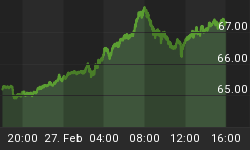The U.S. Dollar traded mixed overnight in light trading ahead of today's FOMC announcement. Traders are looking for the Fed to leave interest rates unchanged and to let the asset-buyback program conclude in September as originally projected. Traders will be looking for language regarding the current state of the economy and the possible announcement of an exit strategy from the current easy money policy. The surprise that could move the market will be an extension of the quantitative easing program.
This morning the trade deficit came out close to the forecast. Traders did not react to the number very much with the Dollar continuing to trade mixed.
The September British Pound is trading under some light selling pressure. The fundamentals and the chart pattern support a decline but traders will allow the Fed announcement to trigger the next move. The Bank of England's announcement to expand its asset buyback program is the catalyst for the recent weakness.
Bearish Euro traders want to see more evidence that the U.S. economy is on a faster pace to recover from the recession before the Euro Zone. Weakness has been developing in the Euro since the release of the U.S. employment data on August 7th.
A weaker stock market is likely to trigger more buying in the Japanese Yen as Japanese investors repatriate funds. Investors who borrowed Yen to buy equities are also selling stocks to payback loans. These events are putting selling pressure on the September Japanese Yen.
Traders are continuing to punish the Canadian Dollar. Last week's bearish Canadian unemployment number has caused investors to take a harder look at the Canadian economy to find a reason to justify the recent rally in the September Canadian Dollar. Speculation that the U.S. economy is on a path to recovery at a faster pace than Canada's is triggering the current rally along with weaker crude oil and equity markets.
September Treasury Bonds are seeing some light buying this morning. The current support is coming from the weaker equity markets and the better than expected auction results. Traders sold stocks yesterday to take advantage of the attractive yields offered by the Bonds and Notes. In addition, the higher yields and the possibility of a recovery in the U.S. economy helped boost foreign interest in U.S. Treasury instruments.
Stock index futures are called flat to slightly better. Traders are concerned that stock prices are too far ahead of corporate earnings. Investors may start to demand to see an increase in revenues rather than earning boosts due to cost cutting.
Money is still on the sidelines but will not be deployed into the stock market unless the Fed offers some solid evidence that the U.S. economy has reached a turning point. If the Fed opts to extend quantitative easing then equity prices may fall on the thought that the economy may not be as strong as stock price suggest.















